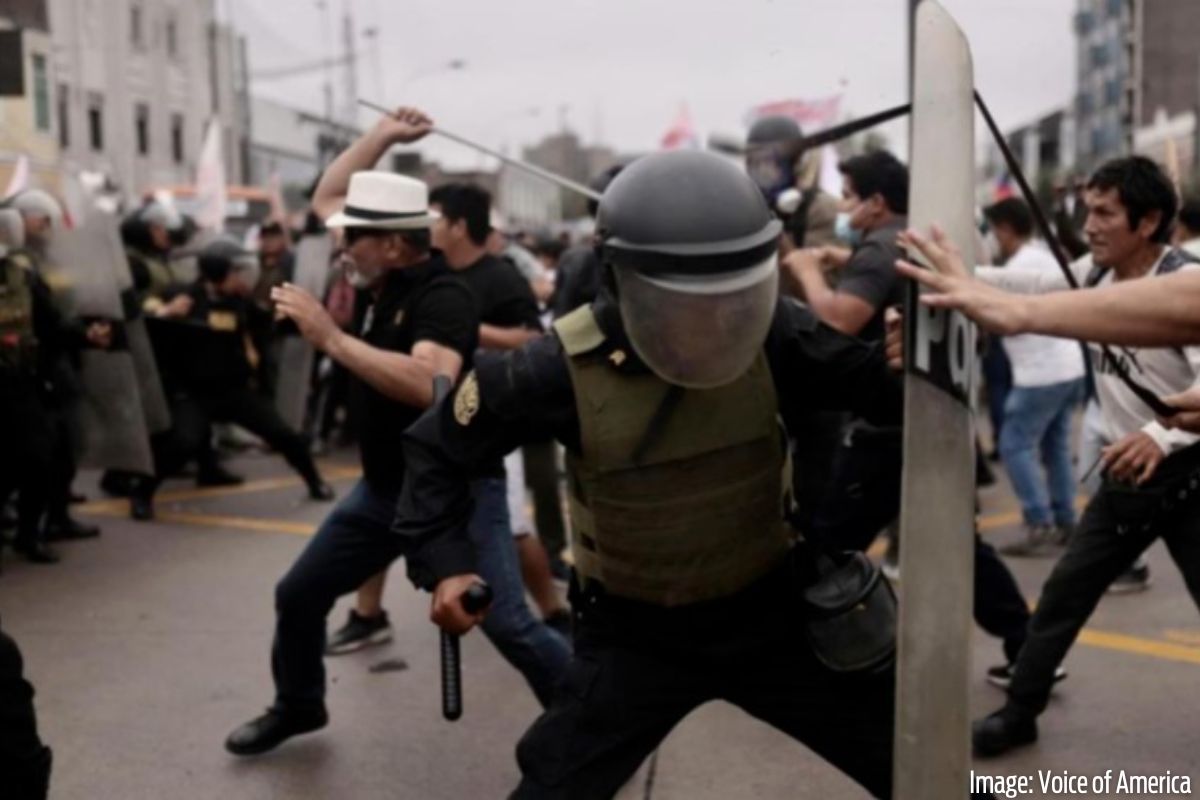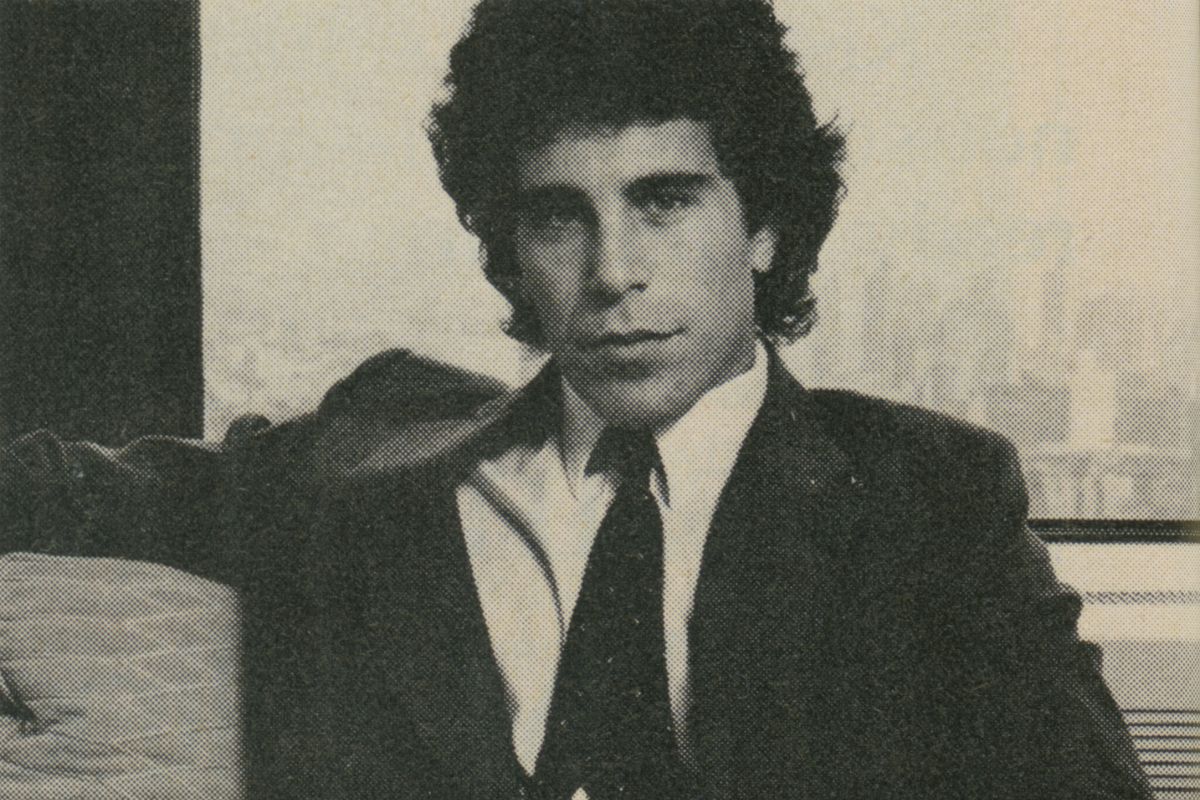In the face of ongoing protests against the coup in Peru, the illegitimate government of Dina Boluarte has declared a state of emergency in several regions and a curfew in Puno.
It has also proceeded to arrest 14 prominent trade union and social activists in the last few days – among them the secretary general of the CGTP union in the San Martin region, Henry Mena (in the picture), and the president and seven leaders of the Ayacucho Peoples Defence Front.
1/ PERU URGENT ALERT:
The illegitimate government of Dina Boluarte has proceeded to arrest 14 prominent trade union and social activists in the last few hours, including the gen sec of CGTP union in San Martin region and the president and 7 leaders of the Ayacucho Defence Front pic.twitter.com/xOpBvAytJW— Jorge Martin ☭ (@marxistJorge) January 16, 2023
Boluarte’s government has also attempted to criminalise the entire movement with slanderous accusations of “terrorism”, “links with drug trafficking”, and “having received arms from Bolivia”. (See below for more analysis.)
The brutal state repression has already left at least 48 dead – killed by the army and police on the orders of the illegitimate ‘president’ Boluarte, since the coup against President Castillo on 7 December. (See below for background analysis of recent events in Peru.)
The country’s main trade union confederation, the CGTP, together with other organisations, has called a general strike for 19 January, and demonstrators from all over the country are gathering in the capital, Lima, for a new “march of the 4 of 4 suyos”, like the one which overthrew Fujimori in 2000.
We call on trade union, youth, and student organisations around the world to pass resolutions and organise pickets and public events to condemn this attack on democratic rights, demand the immediate release of the detained social and trade union leaders, and repudiate the coup government of Dina Boluarte.
Comrades from @socialist_app and @MarxistStudent Federation present at London picket against coup in Perú pic.twitter.com/VjztYBNVLH
— Jorge Martin ☭ (@marxistJorge) December 15, 2022
Public meeting: Solidarity with the struggle of Peruvian workers and peasants
On Wednesday 25 January in London, the Marxist Student Federation, Plataforma 12 de Octubre, and Hands Off Venezuela are jointly hosting a public meeting in solidarity with the struggle of Peruvian workers and youth.
We invite our readers and supporters to attend in order to discuss the events in Peru, and to hear from speakers such as:
- Betty Rhaza (Movimiento Micaela Bastidas and Plataforma 12 de Octubre)
- Cesar Burga (Izquierda Socialista, IMT Perú)
- Jorge Martín (Editor of América Socialista, International Marxist Tendency)
Wednesday 25 January, 7pm
University College London
South Quad Pop Up Learning Hub, Room 102
Nearest tube: Euston Square
Mass movement prepares march on Lima
By Jorge Martin
This is a crucial week for the movement against the coup in Peru. Despite brutal and continued repression, the workers, peasants, and students in struggle against illegitimate president Dina Baluarte have continued fighting. The country’s trade union confederation CGTP has called for a national strike on 19 January, and columns of protesters are converging on the capital Lima.
Faced with growing anger and opposition, the response of the state and its institutions continues to be one of repression and criminalisation of the movement.
This week, 14 social and trade union leaders have been arrested. Amongst them is the general secretary of the CGTP in the region of San Martin, in the north. The counter-terrorism branch of the Peruvian police has also detained the president and seven leaders of the Ayacucho Peoples Defence Front, a mass social organisation leading the movement in this Andean Department.
Police also harassed those attending a gathering of the National Peoples’ Assembly to coordinate the work towards the 19 January general strike. Police surrounded the building of the Telephone Workers’ Union in Lima, where the meeting was to be held, and in a provocative way proceeded to demand ID from all those attending.
Criminalisation campaign
Part of the campaign of criminalisation of the movement of workers and peasants is the constant slandering of those participating as terrorists.
This was particularly the case with the arrest of the leaders of the Ayacucho Peoples’ Defence Front, who were accused of being senderistas (members of the Shining Path guerrilla organisation), despite the fact that this has all but disappeared.
Never mind the facts, the ‘terrorist’ nature of those arrested was splashed across all the frontpages of the daily media and broadcast widely on the TV stations.
An even wilder allegation made against the movement was that “weapons and ammunition” had been smuggled in from Bolivia and that this would explain why so many people (18) had been killed in Juliaca, Puno on 9 January.
The facts, however, are stubborn. No actual evidence that the protesters had weapons, even less “expanding dumdum bullets” has been presented. The official forensic report for those killed is clear: nine of those killed had bullet fragments in their bodies and the others had also been killed by gunshots. All of those could be traced back to police issued AKM assault rifles (in six cases), police pellets and police handguns.
The illegitimate president Boluarte has also declared, again, a state of emergency in several provinces and departments across the country and a curfew in Puno. This means basic democratic constitutional guarantees are suspended.
The declaration of the state of emergency last year, ahead of the 15 December general strike, was the prelude to massacres in which the police and the army killed at least 28 unarmed civilians, including 10 in Ayacucho in a single day.
It is the duty of the international labour movement to energetically raise its voice against this brutal repression and to reject the illegitimate coup-president Boluarte.
Marcha de los 4 Suyos
The tactics of the ruling class and the government are not a sign of strength, but rather an indication of panic, faced with a growing movement which repression has not been able to stop.
Thousands from across the country, not only from the poor Andean regions in the south, but also from the north, are making their way to the capital Lima with one aim: to bring down the hated, bloodstained Dina Boluarte.
The movement has become known as the “marcha de los 4 Suyos” (march from the four corners), after the massive march on Lima in 2000, which finally brought down the dictatorship of Fujimori.
Workers, peasants, and students in towns and cities have organised collections of money and food to sustain delegations to the capital. They are coming from the aymara-speaking regions, from the rondas campesinas (peasant patrols) north of Lima, from Ayacucho, from the jungle regions in the east, etc. Police roadblocks are stopping some of the caravans, but the people are finding ways to get through.
The movement has widespread popular support, from which it derives its strength. According to a recent opinion poll by IEP, 60 percent of the population think that the protests are justified (72 percent amongst the youth), and 58 percent think that the police and army committed excesses (70 percent amongst the youth).
On the other hand, 71 percent disapprove of Dina Boluarte’s presidency, with a mere 19 percent in favour. Congress is even more discredited with a record 89 percent against.
An overwhelming 69 percent of the population now think there should be a Constituent Assembly, up 22 points since a year ago – an indication of widespread rejection of all existing bourgeois institutions.
The government of Boluarte is against the ropes, with even some institutions coming out openly against her. Several regional governors are demanding her resignation, with even some of her own ministers tending their resignation.
The march on Lima and the general strike could be the last blow, which forces the ignominious collapse of this illegitimate president.
“Never again poor people in a rich country”
The mass movement of workers and peasants has grown in strength and acquired a certain degree of national coordination.
Its political programme so far is limited to democratic demands: freedom for Castillo, closing down of congress, new elections, and a constituent assembly.
But what lies behind these demands is a deep seated desire for fundamental change – one which is not limited to just political questions, as important as they are, but which is based on a desire for a general improvement of living standards and a substantial redistribution of wealth.
Castillo’s election slogan “never again poor people in a rich country” encapsulates what’s behind this mass movement. Peru is indeed a wealthy country, but one where power and resources are in hands of a handful of parasitical economic groups, national and multinational, while the majority of the people live in poverty conditions.
It is significant that the movement is making reference to the march of the 4 Suyos in 2000, and also raising the slogan of “todas las sangres” (meaning all the different ethnic and national groups which make up the country).
The idea is that the workers and peasants of Peru, united as a single fighting unit, converging on the capital, can bring down the government. That is correct.
What happened after the overthrow of Fujimori in 2000, however, was the coming to power of self-styled social democrat Alan Garcia, who then proceeded to continue the ultra-liberal capitalist economic policies of his predecessor.
The peoples’ victory was transformed into disillusionment, as the mining multinationals and 17 Peruvian economic conglomerates continued to loot the country’s wealth, bribing presidents and state officials in the process.
This time, the issue must be posed point blank. For there to be real meaningful change, for which nearly 50 have already given their lives in the last 40 days, the masses must brush aside not only the rotten institutions of bourgeois power, but also expropriate the capitalist oligarchy and the multinationals.
On this basis, the country’s wealth can be democratically planned, under workers’ control, in the benefit of the majority. That is the only prize worthy of the blood that has been shed in this struggle.
- Victory to the Peruvian workers and peasants!
- Down with Dina Boluarte! Close down Congress! Kick them all out!
- Expropriate the capitalist oligarchy and the mining multinational!
- All power to the working people!
Mass movement of workers and peasants defies capitalist coup despite brutal repression
Jorge Martin
One month after the coup against president Castillo on 7 December, the new illegitimate government of Dina Boluarte has used brutal police and army repression to put down protests, leaving 45 dead.
Workers and peasants have resisted the coup with mass demonstrations, road blockades, national and regional general strikes and the formation of committees of struggle across the country in a movement that has its epicentre in the poorer, more indigenous southern departments.
Who was behind the 7 December coup? And what are the prospects for the mass movement of resistance?
Castillo’s victory
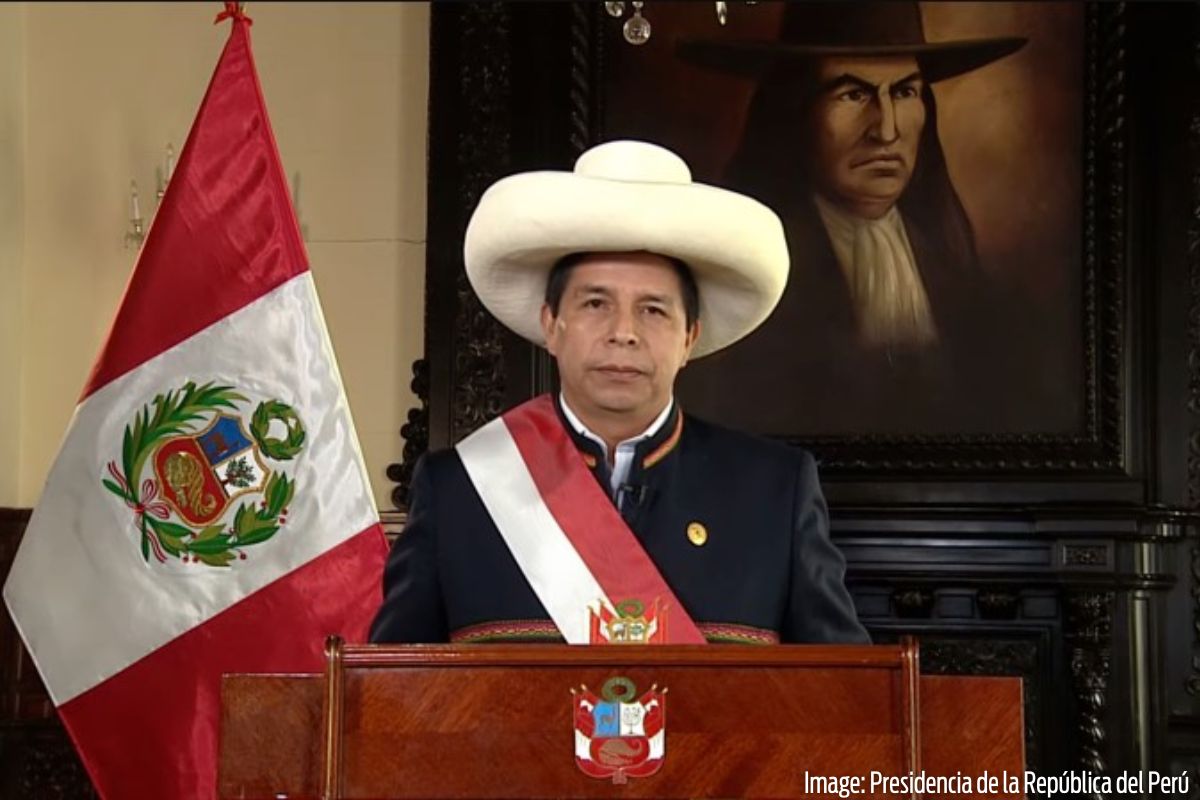
Pedro Castillo was elected in a very close second round of the presidential election in July 2021, as the candidate of the Peru Libre (Free Peru) party, defeating right-wing demagogue Keiko Fujimori, the daughter of former dictator Alberto Fujimori, who was the candidate of the ruling class and the mining multinationals.
Castillo’s campaign, under the slogan “never again poor people in a rich country”, captured the imagination of millions of workers and peasants, particularly in the poorer regions of the country, where the proportion of indigenous quechua and aymara speakers is also higher. In some of the mining districts, he received over 80 percent of the vote.
The expectation was that, after decades of extreme liberal capitalist policies in favour of the interests of the big mining multinationals, their power and multi-billion profits were going to be rebalanced in favour of the majority of Peruvians.
Castillo’s programme promised to renationalise the Camisea gas field and to renegotiate the mining contracts, which account for the biggest share of the country’s exports and government revenue. Copper and gold are the country’s main mineral products, with contracts in the hands of a handful of US, UK, Canada, China and Mexico-based multinationals.
Castillo threatened that, if multinationals did not agree to renegotiate the contracts, they would be nationalised. This of course raised alarm bells amongst the Peruvian capitalist oligarchy and the multinationals – a compact group of 17 large companies that control the country’s economy, mass media, the state, and the main political parties.
Despite a campaign of lies, slanders and manipulation, Castillo managed to win the election, the results of which were contested for weeks by Fujimori’s supporters.
Concessions under pressure
The programme of Peru Libre, on which Castillo stood, contained a contradiction. Despite the party declaring itself ‘Marxist, Leninist, and Mariateguist’, its platform was not a socialist one based on the expropriation of the means of production, to be used in a democratic plan of production under workers’ control. Rather, it talked about a vague and undefined “people’s economy with markets”, calling on the national bourgeoisie to work for the benefit of the majority.
That is completely utopian. The capitalist class is only interested in maximising profits. Any individual capitalist who chooses another path would be quickly put out of business by their competitors.
In a country like Peru, additionally, the local bourgeoisie is subordinated and linked to foreign imperialist multinational interests by a thousand threads. In reality, it is the mining multinationals that rule the country, in collaboration with their local agents in the capitalist oligarchy.
Once elected, Castillo was faced with a very complicated situation, with a hostile parliament in which he was in a small minority. At the time, we warned that he had two options: either base himself on the mass mobilisation of the workers and peasants in the streets to deal blows against the ruling class and the multinationals; or be trapped by the very unfavourable balance of forces in the bourgeois institutions and forced to make concessions to the capitalist oligarchy.
Right from the beginning, he chose the second option: concessions and retreats from his own programme. He dismissed his foreign minister, Béjar, as he had upset the military high brass by mentioning the role they had played during the dirty war against the Shining Path guerrillas. He then dismissed his prime minister, Bellido, as he was seen as too radical for the capitalist elite. The minister of labour who dared to propose a law against subcontracting (one of the main scourges of the Peruvian working class in the last three decades) was also removed.
Having promised to increase royalties on the mining companies, he then dropped the idea, under pressure. In a visit to the US, he reassured foreign multinationals that their investments would be safe.
As a public sign of his shedding any radical credentials, he also broke with Peru Libre, which further decreased the size of his own parliamentary group, now split in two. The idea of a Constituent Assembly to re-draft the Constitution, which dates back to Fujimori’s dictatorship, was dropped in the face of lack of parliamentary support for any move in that direction.
However, as it is always the case, every concession he made was seen as a sign of weakness by the rich and powerful, who then proceeded to demand more concessions. At the same time, every concession had the effect of weakening his own base of support. The campaign of attacks through the media, with motions of no confidence in parliament, baseless allegations of corruption and nepotism continued unabated.
Still, the ruling class was never reconciled to Castillo. The workers and poor who had voted for him still saw him as one of their own and were emboldened in their demands. Local communities disrupted mining operations, demanding a share of the profits. An article in Reuters in July 2022 carried the headline “Peru’s mining execs ‘lose faith’ in gov’t despite moderate shift”, which summed up the situation.
Castillo had been elected on the strength of his programme, and also of his background – that of a teacher trade unionist who had led a successful national movement, who also had roots in the rondero peasant patrols’ movement.
The racist Peruvian oligarchy could not stomach the idea of a man coming from the working-class and poor majority occupying the country’s highest office. Despite his concessions and accommodations, he had to go.
Coup launched
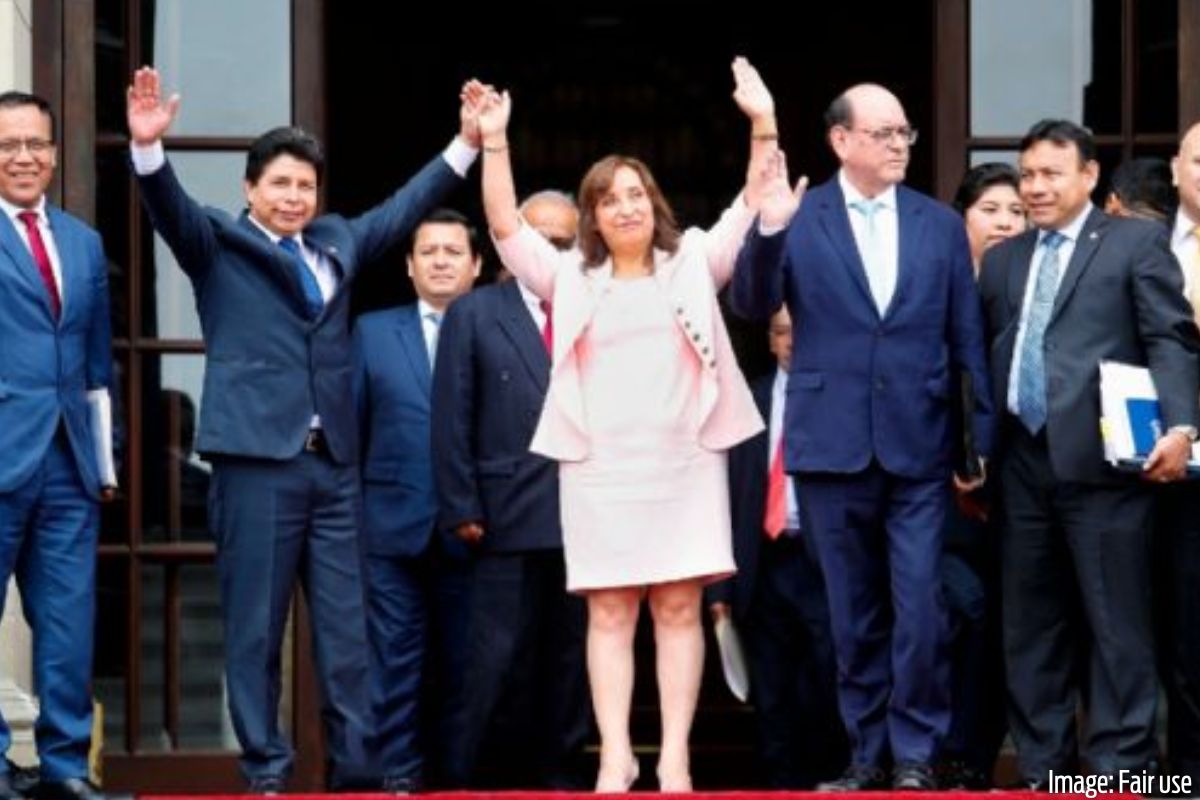
On 7 December, the coup was consummated. Castillo was facing, for the third time, a motion of no confidence in parliament, under the wide-ranging charge of ‘permanent moral incapacity’, for which no actual proof of any wrongdoing is needed.
To preempt the move, he made a national broadcast in which he announced the disbanding of the parliament, which had constantly blocked his initiatives and called for new elections within four months. He also announced the convening of a Constituent Assembly. This was within his powers. But it immediately led to a counter-reaction by all the powers of the capitalist state.
His own ministers deserted him; the state prosecutor issued an arrest warrant against him; the capitalist media shouted that he had carried out a coup.
By the end of the day he had been arrested, parliament had voted for his removal and a new illegitimate president had been sworn in, his deputy Dina Boluarte.
Behind this ;constitutional; coup was the bosses’ organisation CONFIEP, the mass media, all branches of the state apparatus, the mining multinationals and of course, the US embassy, which hurried to recognise the new illegitimate government.
The presidency of Castillo raises starkly the question of the limits of the so-called ‘progressive governments’ in Latin America. Any attempt to meddle with the interests of the ruling class and the powerful multinationals, which are looting these countries’ ressources, will be met with a relentless campaign of destabilisation.
The capitalist oligarchy will use all means at their disposal to defend their interests. They will attack any president that threatens them, however mild his or her programme might be – up to and including removing them from power. For them, bourgeois democracy is a tool that is useful only as long as the results it produces guarantee their private profits, wealth, and power.
What they had not counted on was the reaction of the masses of workers and peasants. For them, the issue was clear: the president they had elected, Castillo, one of their own, had been removed by the capitalist oligarchy. That could not be allowed, it was an attack on their democratic rights and aspirations. A mass movement started, with road blockades, massive demonstrations and protests across the country.
The movement was growing in intensity, with protesters taking over regional airports and in some cases ransacking the regional and local offices of the judiciary and the state prosecutor. The illegitimate president feared losing control of the situation and reacted by using brutal repression.
Faced with a call for a nationwide general strike on 15 December, she declared a state of emergency, and then imposed a curfew in several of the southern departments where the protests were more intense. Finally, she sent the army against the demonstrators.
In Ayacucho, the masses defied the army and – forcing their way through lines of soldiers armed with weapons of war – marched into the city centre. The death toll quickly escalated to nearly 30 unarmed civilians killed by the army and police.
Castillo was remanded in custody for 18 months – longer than he had been allowed to sit in the presidential office for!
Where next?
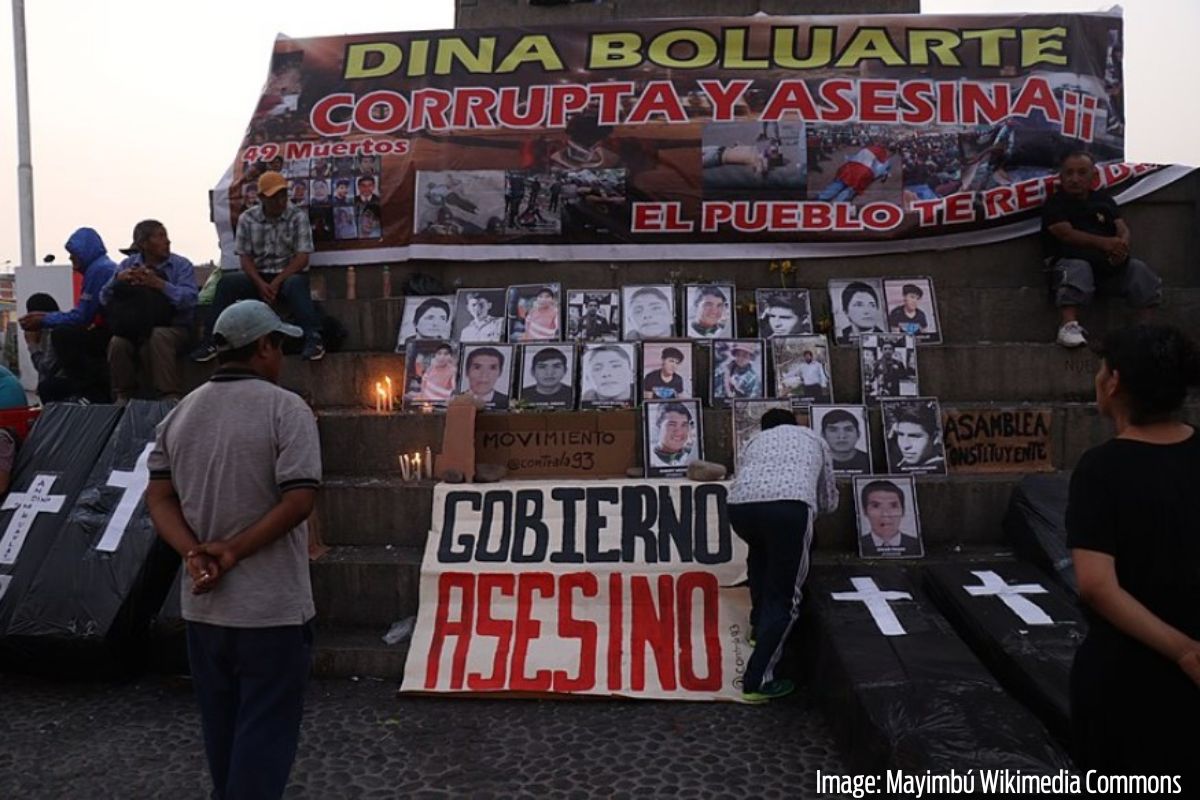
The repression and the arrival of Christmas forced a pause in the movement. This was used to discuss strategy and strengthen its organisation.
A meeting of representatives of workers and peasant organisations from the southern departments agreed to call an all-out strike in the whole of the region and the formation of joint strike committees. The meeting called for the movement to spread to the rest of the country and announced a ‘marcha de los 4 suyos’ – a march on Lima with the same name as the huge national march in 2000 that brought down Fujimori.
The renewed strike movement was met again with brutal state repression, using the state of emergency powers, which remain in place.
9 January saw another massacre – this time in Juliaca, Puno, where the police opened fire on the aymara-speaking protesters which had gathered from the rural districts, killing at least 18, including a minor and a junior doctor who was helping the victims.
The demands of the movement are clear: Freedom for Castillo; the closing down of the coup-plotting corrupt congress; ousting of murderous ‘president’ Boluarte; new elections; and a constituent assembly.
Constituent assembly
These are basic democratic demands against the coup. But the workers and peasants already understand that new elections, in and of themselves, would not solve the problem. The whole of the political system is rotten to the core and skewed towards the interests of the ruling class.
In fact, what the mass resistance movement has put on the table is: Who rules the country? Is it the working-class majority, workers, peasants, students, the women, the indigenous peoples? Or is it the unelected and unaccountable capitalist oligarchy, the army, the owners of the mass media and the mining multinationals?
The question of the Constituent Assembly, in the eyes of the masses of workers and peasants, represents precisely that – a root and branch reorganisation of political power and a chance for the working class majority to impose their own rules.
We need to warn, however, that a Constituent Assembly – that is, a reform of the political structures – would not solve the fundamental problems that affect workers and peasants in Peru.
Several other countries in the region have had constituent assemblies in the recent past, including Bolivia and Ecuador, and the ruling class in those countries still has their economic power intact.
At some point, if the movement is strong enough and threatens to brush aside the ruling class as a whole, a Constituent Assembly of some sort might be conceded, in order to derail the insurrectionary movement of the masses along safer bourgeois constitutional channels.
This is exactly what happened in Chile with disastrous results. The 2006 Constituent Assembly in Bolivia played the same role, providing a constitutional way out to the 2005 revolutionary movement during the gas wars.
Heroic struggle
In struggling for democratic demands, revolutionary Marxists point out the need to deal with the question of who controls the economy and the country’s resources. That means not just changing the Fujimori constitution, but actually expropriating the 17 groups that control the country’s economy as well as the mining multinationals.
Only by putting the wealth of the country in the hands of the working people can the slogan “never again poor people in a rich country” be carried out into practice.
For the movement to be victorious, the general strike needs to be widened nationally. The comrades of the IMT in Peru are calling for a National Revolutionary Assembly of Workers and Peasants, with delegates elected with the right of recall from every workplace, working-class neighbourhood, and peasant community to take the reins of the country.
The agreements arrived at the meeting of worker and peasant representatives from the south point in the right direction. The masses have responded heroically, despite murderous repression.
It is the duty of the international labour movement to organise solidarity with the heroic resistance of the Peruvian workers and peasants which is an inspiration to us all.
Marxist Students attend Peru solidarity demonstration
Marxist Student Federation
On 15 December, Marxist Student activists attended and spoke at the emergency demo called by the Plataforma 12 de Octubre, in solidarity with the struggle of the workers and peasants of Peru against the oligarchic coup which took place last week.
Gathered at Trafalgar Square on a cold winter evening, the crowd was very militant and vocal, with a number of demonstrators coming from Peru or other countries in South America, such as Ecuador, Bolivia, Cuba, and Argentina.
The speeches outlined the ongoing events in Peru to those passing by, and raised the main demands of the movement: kicking out the oligarchy; freeing Castillo; and for new elections to take place immediately.
Some speakers went on to point out the role of imperialism in the coup, exposing the role of the US and European imperialists in supporting this new unelected government. One speaker even made clear what our role as workers and youth in Britain should be: not just showing solidarity to the Peruvian people, but crucially to fight our own ruling class at home.
Many demonstrators voiced their support of the national general strike taking place in Peru on 15 December, and raised the need for the workers and the peasants to take power into their own hands to throw out this corrupt government. One of the most popular slogans at the demonstration was ‘kick them all out!’
A Marxist student from the KCL Marxist Society gave a speech, in which he affirmed the Marxist Student Federation’s complete solidarity with the Peruvian workers, peasants, and youth. This internationalist message was received with enthusiasm from the crowd.
View this post on Instagram
Jorge Martín, a writer for In Defence of Marxism – the website of the International Marxist Tendency – also gave an inspiring speech, which outlined the reasons why this coup has taken place, and denounced the ‘state of emergency’ which has been imposed by the new illegitimate government to crack down upon the mass movement.
As Jorge pointed out:
“What is at stake in Peru is ‘who rules the country?’ Is it the democratic will of the majority of the people: workers, peasants, the youth, women, the indigenous people? Or is it the unelected, unaccountable oligarchy who controls political power and wealth?”
London picket in solidarity with the struggle of Peruvian workers and peasants against the coup. “Let the working people decide, not the oligarchy” pic.twitter.com/vVuCMn7eT5
— Jorge Martin ☭ (@marxistJorge) December 15, 2022
Our comrades raised the demand of uniting the mass movement into a National Revolutionary Assembly of Workers and Peasants, with the aim of removing the usurpers and expropriating the oligarchs and multinationals.
Passers-by came up to ask about what the demonstration was about, as many are not aware of the situation in Peru – owing to the fact that the capitalist media has barely mentioned it! We handed out dozens of leaflets in both English and Spanish, putting forward our Marxist analysis and programme.
The Marxist Student Federation stands in full solidarity with the workers, peasants and youth in Peru, in their fight against this coup and to determine their own future.
Free Castillo! Let the working people of Peru decide! For a National Revolutionary Assembly of Workers and Peasants! Kick out the oligarchs and usurpers!
To support the struggle in Peru, we must overthrow the imperialists at home!
MSF solidarity message with the masses in Peru
Marxist Student Federation
The Marxist Student Federation, representing students from over 50 universities and colleges across Britain, stands in full solidarity with the mass movement taking place in Peru.
On 9 January, another massacre took place where 18 people were killed, including a 16-year-old student and a junior doctor who was helping the victims. This brings the death toll to 49 in more than a month of unrest after the coup against president Castillo on 7 December.
The new illegitimate government of Dina Boluarte has used brutal police and army repression to put down protests. Workers and peasants have resisted the coup with mass demonstrations, road blockades, national and regional general strikes, and the formation of committees of struggle across the country in a movement that has its epicentre in the poorer, more indigenous southern departments.
Castillo’s campaign, under the slogan “never again poor people in a rich country”, captured the imagination of millions of workers and peasants, particularly in the poorer regions of the country, where the proportion of indigenous quechua and aymara speakers is also higher.
The expectation was that after decades of extreme liberal capitalist policies in favour of the interests of the big mining multinationals, their power and multi-billion profits were going to be rebalanced in favour of the majority of Peruvians.
The demands of the movement are clear: Freedom for Castillo, the closing down of the coup-plotting corrupt congress, ousting of murderous ‘president’ Boluarte, new elections, and a constituent assembly.
These are basic democratic demands against the coup. But the workers and peasants already understand that new elections, in and of themselves, would not solve the problem. The whole of the political system is rotten to the core and skewed towards the interests of the ruling class.
Only by putting the wealth of the country in the hands of the working people can the slogan “never again poor people in a rich country” be carried out into practice.
It is the duty of the international labour movement to organise solidarity with the heroic resistance of the Peruvian workers and peasants which is an inspiration to us all.
Solidarity with the struggle in Peru!
Down with the coup! Down with the oligarchy!

